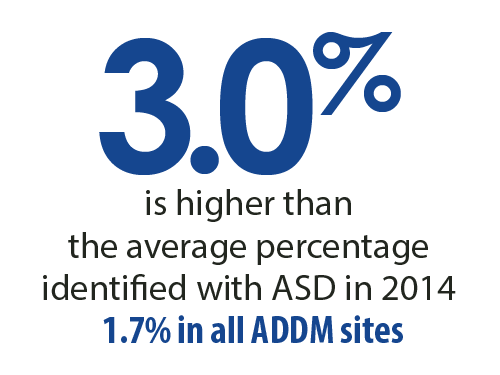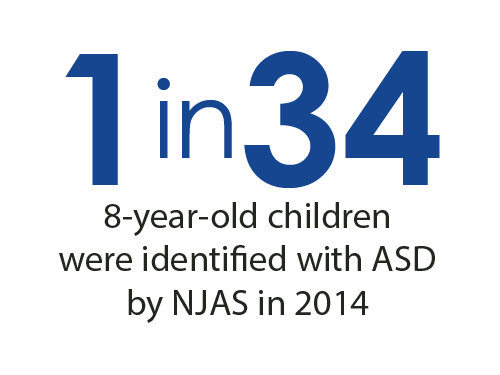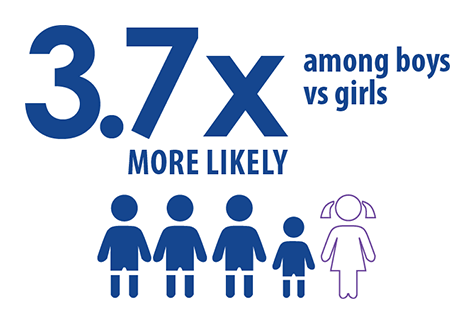A Snapshot of Autism Spectrum Disorder in New Jersey
Pages in this Report
- 2023 Community Report on Autism
- Executive Summary
- Key Findings from the ADDM Network
- A Deeper Dive
- Spotlight On: Progress in Early Identification Disrupted during the COVID-19 Pandemic
- Spotlight On: A New Pattern in Racial and Ethnic Differences
- Data for Action
- ADDM Network Site Snapshots Overview
- A Snapshot of Autism Spectrum Disorder in Arizona
- A Snapshot of Autism Spectrum Disorder in Arkansas
- A Snapshot of Autism Spectrum Disorder in California
- A Snapshot of Autism Spectrum Disorder in Georgia
- A Snapshot of Autism Spectrum Disorder in Maryland
- A Snapshot of Autism Spectrum Disorder in Minnesota
- A Snapshot of Autism Spectrum Disorder in Missouri
- A Snapshot of Autism Spectrum Disorder in New Jersey
- A Snapshot of Autism Spectrum Disorder in Tennessee
- A Snapshot of Autism Spectrum Disorder in Utah
- A Snapshot of Autism Spectrum Disorder in Wisconsin
- Glossary
- References
Download and print this page [PDF – 257 KB]
Findings from the New Jersey Autism Study (NJAS) help us to understand more about the scope of autism spectrum disorder (ASD) in children, describe the expression of ASD in those children, and identify disparities in the prevalence or detection of ASD.


Boys were more likely to be identified with ASD than girls.

No significant difference was found in the percentage of white, black, and Hispanic children with ASD.
New Jersey had intelligence quotient (IQ) data available for 72.1% of children identified with ASD. Of those children, 28% had intellectual disability.

Intellectual disability is defined as an IQ score of 70 or lower.
Frequently Asked Questions
What are the key take-away messages?
- The percentage of children with ASD increased in New Jersey, from about 2.5 percent in 2012 to about 3 percent, in 2014. Rising numbers of children with ASD need services and support, now, and will require significant resources as they grow into adolescence and adulthood.
- Boys continue to have a higher ASD prevalence than girls. In 2014, almost 4 percent of boys in the area were identified with ASD, compared to about 1 percent of girls.
- ASD prevalence in New Jersey did not vary by race or ethnicity in 2014, unlike in 2012, suggesting that progress has been made in identifying all children with ASD.
- In spite of the fact that developmental concerns are noted in many of children’s records by 3 years of age, fewer than half of children with ASD received a comprehensive developmental evaluation by this same age. This lag between first concern and first developmental evaluation may affect when children are being diagnosed and connected to the services they need.
- ASD can be diagnosed as early as 2 years of age; however, about half of children were not diagnosed with ASD by a community provider until after 4 years of age.
- Future efforts may emphasize the importance of screening young children with standard tools and connecting families to needed services before 3 years of age.
- The percentage of children with ASD continues to be higher in New Jersey compared to other areas in the United States where CDC tracks ASD. It is not known exactly why this is so, but geographic differences in evaluation and diagnostic practices for children with developmental concerns may play a role.
How can this information be useful?
The latest findings may be used to
- Promote early identification of ASD,
- Plan for enhanced services and training,
- Guide future research, and
- Inform policies promoting improved health and quality of life outcomes for individuals with ASD.
How and where was this information collected?
NJAS uses a comprehensive, active case-finding method based on the analysis of information from the health and special education records of children who were 8 years old and living in one of 4 counties in New Jersey in 2014.
- Tracking area: Essex, Hudson, Union, and Ocean counties
- Children in tracking area: 32,935 8-year-olds
- 41 percent white
- 22 percent black
- 31 percent Hispanic
- 6 percent Asian or Pacific Islander
- Less than 1 percent American Indian or Alaska Native
What else does NJAS do besides tracking ASD among 8-year-olds?
NJAS collaborates with the New Jersey Departments of Health and Education and local agencies and organizations that serve children with developmental disabilities and their families to track the number and characteristics of 4-year-olds and 8-year-olds with ASD and/or intellectual disability in select areas of New Jersey. NJAS offers information and training on the identification and diagnosis of ASD, sponsors presentations and workshops on ASD topics, and promotes innovative approaches to the detection of ASD.
Get Resources and Connect Families to Services and Support in New Jersey
“The CDC-ADDM Network and the New Jersey Autism Study data have been valuable resources, especially in our work in the early childhood space, toward understanding the scope and impact of ASD and related conditions on children, families and communities. These findings have been helpful to building and sustaining successful partnerships for ongoing promotion of parent engaged developmental monitoring and early identification of ASD and other developmental disabilities in our state.”
– DEEPA SRINIVASAVARADAN
CDC Learn the Signs/Act Early Ambassador to New Jersey & State Parent Lead
for Early Childhood Initiatives, SPAN Parent Advocacy Network
Autism New Jersey
Information, education, and policy initiatives related to ASD
800-4-AUTISM
www.autismnj.org
Early Intervention System
Services for children under the age of 3 years with developmental delays or disabilities
www.nj.gov/health/fhs/eis/
Autism Family Services of New Jersey
Support services for families living with ASD
877-237-4477
www.autismfamilyservicesnj.org
Asperger Syndrome Education Network
Education, support, and advocacy for individuals with ASD and their families
732-321-0880
www.aspennj.org
Department of Education’s Office of Special Education Program
Special education services for school-aged children with disabilities
www.nj.gov/education/specialed/
CDC’s Learn the Signs. Act Early.
Deepa Srinivasavaradan,
New Jersey’s Act Early Ambassador
deepas@spannj.org
Mom2Mom
24/7 peer-support for parents of children with special needs
877-914-6662
www.mom2mom.us.com
Statewide Parent Advocacy Network
Support for parents, including parents of children with special needs
800-654-7726
www.spannj.org
Connect with NJAS
Walter Zahorodny, PhD
Rutgers-New Jersey Medical School
185 South Orange Avenue, F570
Newark, New Jersey 07101
973-972-9773
zahorodn@njms.rutgers.edu
